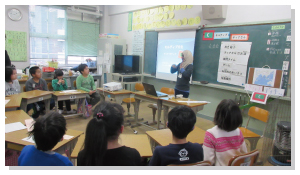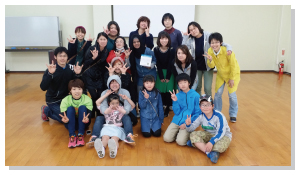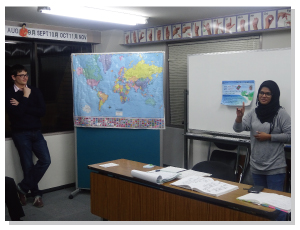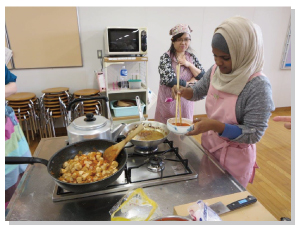- HOME
- Alumni News
- Dheena LATHEEF (16th trainee)
- Dheena's Final Report
Dheena's Final Report
Final Report
Self Introduction
My name is Dheena. I am a member of Maldives’ deaf association. I come from an island located in the southern part of Maldives. When I was a child, I was the only deaf person in the island. I went to a local primary school but there was no education tailored to the needs of deaf children, so I could not understand what the teachers were saying. A few years later, I moved to a school in Maldives’ capital Malé. I was able to follow lessons very easily there, because both teachers and pupils were using sign language. Though I was dreaming about enrolling in a university, I realized that there were no schools that offered higher education for deaf students. I knew that there were so many other obstacles for deaf people than just being unable to proceed to higher education. In order to solve these problems I decided to join the deaf association. Still, I did not know what I should do to change the situations surrounding deaf people. That was why I applied to the Duskin Leadership Training program, for an opportunity to study in Japan.
Before coming to Japan I was quite worried about whether I would be able to keep up with lessons in Japan, but Japanese people were very kind and supported me in a number of ways.
Unforgettable Memory
Home-Stay
I stayed at the home of Ms Sachiyo Yoshino, in Fukuoka Prefecture. Her father said it was fun to speak with me because by then I was able to communicate in Japanese sign language. Coming from a warm country, the coldness of Japanese winter was quite tough for me. But I had a wonderful time, helping the family, and cooking them dishes from Maldives. They also took me to a number of places and also gave me a chance to try on a kimono, the traditional Japanese garment.
Ski Training
We went to Niigata Prefecture for our ski training. I had never seen or touched snow, because it never snows in Maldives. It felt strangely wonderful. On the first day I could not ski well at all. I fell over a number of times. But by the second day, I managed to ski by myself. I had so looked forward to the ski training, so I wished it lasted longer, not just two days.
Individual Training
There are 1,192 islands in Maldives. However, there are only three sign language interpreters, even in the capital. Sign language interpreters are definitely in high demand. This prompted me to learn how to inspire future sign language interpreters. I also learned about research and analysis related to sign language, needed to instruct sign language. This included grammatical attributes of sign language, and the linguistic differences between sign language and phonetic language. I saw that sign language was taught using a method called “natural approach”. It means making the learner learn sign language naturally, like an infant learning a language without being taught. I was told that complete sign language beginners manage to get to interpreter’s level within two to three years, using this approach. The important thing about natural approach is repeated input and conversation in sign language. I would like to use this approach to inspire future sign language interpreters in Maldives.

The Problems Deaf Women Face and Their Solutions
Often in Maldives, deaf women get raped by hearing men. Many deaf women also, married to hearing men, get subjected to domestic violence. But they cannot consult anyone and often they suffer alone. There are also cases where, deaf children born from hearing parents, face neglect, receive no parental love and become delinquent. I visited deaf women leaders in Nagasaki and Fukuoka Prefectures and asked them what they thought was the best approach to tackle such situations. Especially in Nagasaki, as I stayed at the home of Ms Motomura, we talked about this into the night to think about problems surrounding deaf women. Through this exchange, I realized the importance of creating an environment where deaf women would feel safe to tell their story. When I go back to Maldives, I would like to create such a place, where women can exchange information, or hear each other’s story in a safe and comfortable environment.
Ms Motomura was always kind to me. She cared for me like a mother. At the same time, she was, and still is, a role model for me, working as a leader for deaf women.
Problems of Deaf People Living on Islands
Nagasaki is the prefecture with the highest number of islands in Japan. I wanted to see the lives of deaf people on the islands, so I visited Tsushima and the Goto Retto islands. Just like Maldives, there are no sign language interpreters in these islands, and this meant there were communication problems between deaf and hearing people. The deaf people in these islands did not have adequate access to information because of the lack of interpreters.
In Tsushima, I actually met up with deaf people living in Tsushima to hear their story, especially the problems they faced in their daily lives. I then put together a report to write down everything I learned from the interviews. I also realized that this report could be used as one of the materials to be used for negotiations with the government.
In the Goto Retto islands, I participated in the meeting of local deaf people, to hear their life stories and what kind of problems they had to overcome till present.
Education for Deaf Children
I visited several deaf schools. At these schools, the teachers knew everything about the characteristics, behaviors and needs of deaf children, and used a number of approaches to cater to every need. For example, in the infant class, the teachers were talking to children—even newborns—in sign language so that they would naturally acquire sign language as they grew up. Also in class, the teachers made sure to have eye contact with the children before they started talking. The level of class goes up gradually, from basic to intermediary, to advanced. I noticed that the teachers repeated what they said, until they were sure the children understood. This way, children improve their learning ability and many proceed to universities in Japan. In Maldives, deaf children learn in the same classroom as hearing children, but often the deaf children cannot keep up and drop out. Of course, once they drop out, employment becomes even more difficult. This is why there are so many deaf people in Maldives who cannot find jobs, and even if they do, they tend to become low-wage workers.
At the school, I was also impressed by the use of information technology in class. For deaf children, it is not possible to look at the textbook in their hands and simultaneously listen to the teachers. Likewise, for teachers, it is not easy to make deaf children raise their face from the books they are reading. So what did the teachers do? They put the textbook in a large screen in front of the children. This way the children could raise their face from the paper textbooks, and also see the teachers.

Changes that Occurred to Me
Until I came to Japan, I had never thought about support for people with disabilities except for deaf people. I was always only thinking about deaf people. However, after spending some time in Japan with people with other disabilities, my feelings changed. Now, I want to start interacting with people with all kinds of disabilities when I go back to Maldives, not just deaf people. Also, until I came to Japan I was relatively shy, but now I am more assertive and I can ask questions without being shy.
My Objectives after Returning to Maldives
After I return to Maldives, I would like to focus on the following four goals.
1. Nurturing Future Sign Language Interpreters
Deaf people need sign language interpreters, for everything from medical services to education and to employment. Having more sign language interpreters is directly constructive to the social inclusion and advancement of deaf people.
2. Developing Maldivian Sign Language
The current Maldivian sign language dictionary has only 300 sign language words. Going forward, I would like to analyze and develop Maldivian sign language, with the goal of creating a new sign language dictionary with approximately 3,000 words.

3. Empowerment of Deaf Women
I would like to create a place where deaf women can get together and enjoy talking to each other. In Maldives, deaf women tend to stay home, unable to share their problems and worries with anyone else. I would like to offer a place where they can casually visit and enjoy chatting, and once they feel ready and comfortable to open up, I would like them to share their worries and think about solutions together.
4. Developing Education for Deaf People
There are no deaf schools in Maldives, and it is not possible for deaf people to proceed to university. There are many deaf people with no employment opportunities because they lack proper education. The only way to change this situation is to change the education for deaf people. It is something that must be done for the future of deaf children.
Words of Gratitude
My fellow 16th Duskin Leadership trainees are like a family to me. I will be sad as we have to part and go our own ways, but I would like to stay friends with them forever, after each one of us returns to our homeland.
Last but not least, I would like to express my heartfelt thanks to everyone I met, including everyone from the Duskin AINOWA Foundation and Japanese Society for Rehabilitation of Persons with Disabilities. Thank you so much.





